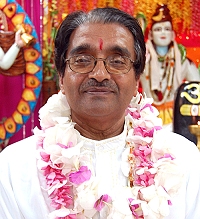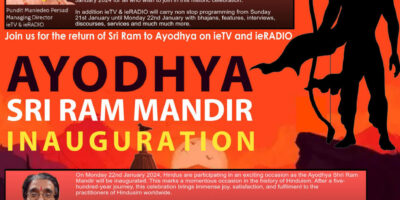Message from the Paramacharya of SWAHA, Pt. Hardeo Persad
Another year has passed and we have yet again congregated to celebrate Indian Arrival Day, 174 years of the presence of East Indians in Trinidad and Tobago. Time will continue churning, as is its nature, bringing with it changes, both good and bad. If we reflect a bit on the last year, we can recognise how very challenging the past year has been for us as a country and as a people. Many suffered immense loss because of floods. Conversely, that period of thunderstorms was followed by intense heat and drought. The farmers, by extension all citizens, have had to undergo rising food prices, worsening quality of fruits and vegetables and a nationwide rationing of water. Some do not even have the privilege of a steady supply of water while others waste without care.
The unemployment rate is rising, leading to an upsurge in crime. We are well aware of the booming crime industry that our country has developed. Our borders aren’t even safe as there is now an influx of migrants seeking a better life. One can only imagine how terrible things must be over there for families to look here with hope. Young boys are being equipped with guns and are committing acts like seasoned criminals. Look at the state of our schools! These institutions should be havens for our children, but violence and drugs are reigning. Children are forced to sacrifice their schooling. Bear in mind that our ancestors placed great emphasis on education yet today, it is mistreated and pushed aside for more fleeting sources of enjoyment and economic gain. How have we reached such a point?
Every day, we hear reports of our careless attitude towards the environment. This is happening internationally. Trinidad and Tobago is a microcosm of the world out there and, as usual, we are not lagging far behind. We treat our land and waters as if they are dumping grounds and sewers. Our beaches and waterways are littered and full of garbage. Is this how we keep our homes? The same respect we afford our living spaces should indeed extend to our country, the land which we inhabit. Hinduism holds Mother Earth, Prithvi Maataa, in high esteem.
We, as a people, are also faced with another dilemma: the survival and continuity of our long-held traditions, customs and value systems. Continuity indicates a certain constancy of flow, a unity of movement and above all, an enhancement of present cultural, social and religious systems. Let’s liken this continuity to a relay race – recently, Trinidad and Tobago won a gold medal in the relay sporting category with each member of the relay team running steadfastly his leg of the race; each man pulled his weight and was responsible and dutiful in his part of the race. Likewise, each generation in society is holding a baton and therefore, at the helm of a leg of life’s relay. Each generation carries the responsibility of maintaining and further enhancing its corresponding leg of the race.
On a yearly basis, we recount the countless blessings that we have inherited from the ancestors; the varied ways in which their actions have strengthened our way of life. They traversed the kaalaa paani to an unknown land and managed to settle and construct a formidable presence. To them, we are always indebted. They are no longer physically present so how can we truly repay this gratitude? How can we really show thanks and appreciation? What is the best way to recognise their contributions? This is the duty of current and future generations. The baton has since passed, and the present generation is charged with maintaining and enhancing these inherited belief and value systems.
I consider myself a member of this current leg of the relay; my generation has been holding the baton for some time, steadfastly as times but the run has also been shaky. Challenges exist now that were not present in the times of our forefathers. They lived a simpler life with a more cohesive family life in which practices, beliefs and ideas were handed over in a seamless way. Even the priesthood followed a predictable flow thereby having an enduring quality about it. We grew up in big, extended families where all were charged with the social, cultural and religious education of the child. This included the community and country at large. This system ensured that the child received and therefore inherited the beliefs and values that qualified our ancestors. Nowadays, we live a more isolated life with different family types, new ones being created every day. The age gap between generations is becoming wider and deeper thereby generating a chasm and rift that can seem uncrossable.
At present, the continuity of our systems is at risk. One cannot deny this reality. The youth is faced with competing interests and alluring alternatives. My way of life seems obsolete and old fashioned compared to what is offered and what is possible with modern technology. There has been a paradigm shift in the way of thinking and behaving. These customs, practices and beliefs are viewed as antiquated and unpopular. Our way of dress, our food and our ancestral language have all been diluted to usher in a more westernised way of life. The concept of paro–upkaar or voluntary, selfless service to mankind has not endured. Yes, there are some who still give of themselves, but most see it as a waste. The irony is that in today’s world, there is no shortage of the destitute and those in need, yet we seem hard-pressed to find committed and interested young persons to hold this baton in the continuing leg of the relay. A mundane example is that of weekly cleaning of the temple – the current generation became adults in the temple. This is where they grew and were nurtured so caring for and cleaning the temple are/were automatic. Now, a cleaning schedule must be created and even with one, the task still remains to a select few. There is no willingness to give of oneself. Our minds have been taken over by the give and take attitude – in order to give, I must also get.
How can we compete against the influence of the media which includes songs, movies, reality television? What about the internet and its social media? It is no longer necessary to meet people face to face in order to engage, converse and make friends. The rules of social engagement have changed to such an extent that what was once a social faux pas is now completely acceptable. The advent of the smart telephone has been catastrophic to our youth. They have developed double personalities: one online and one in real life. Which is real? Good parenting is of immense importance but being a good parent is tricky and dubious when confronted with such interests.
Changes are inevitable; technological advances are unavoidable. They all bring both positive and negative. The trick is to use rather than abuse. In the same way, adjustments and adaptations to our traditions, beliefs and customs must happen. They must evolve as has our way of life. Social, political and economic advancements are meant to ease our living but should not come at the expense of our core value systems. Moderation is key and each person much do his/her part in the relay. To the future generation, I say that there are certain values that never go out of fashion; not all our ideas are dinosaurian. Some still hold great value. To my current generation, I implore you to recognise these challenges and make the necessary changes in your approach otherwise we will lose future generations. Adaptations and adjustments are of extreme necessity if we hope to hand over the baton.




ISWAR PRASAD DASH
DEAR PRASAD JEE,
NAMSKAR. I AM YOUNG PERSON FROM INDIA APPRECITING YOUR VALUBLE ARTICLE. YOU ARE REALLY GENIOUS AND REAL GEMS OF HINDU RELIGION. DAY BY DAY OUR SOCIETY GOING TO VERY SELF CENTRE BUT WHAT WILL OUTCOME FOR THEM. PEACE COME FROM SPIRITUAL WORK AND THOUGTS NOT FROM SMART PHONE.
HOPING YOUR BLESSING TO ME